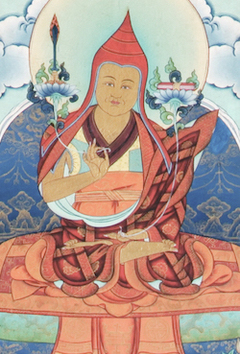Retreat Advice
Retreat Advice
by Dodrupchen Jigme Tenpe Nyima
Namo guru!
If your time in retreat is well spent, you will delight the buddhas and their heirs, help fulfil the vision of the Precious Guru of Oḍḍiyāna, and plant the seed of prosperity and success for this and future lives. This is especially true in this Dharma lineage of ours, in which the earlier and later omniscient ones[1] and the many vidyādharas who reached the bhūmis directed their wisdom minds and made powerful and prophetic prayers of aspiration. Even now the stream of their blessings has not diminished, and, as a result, it is said, your retreat will be infused with auspiciousness and blessings, and everything will turn out well.
If, by contrast, you do not put your time to good use, then what is the point of being in the mountains with only wild birds for neighbours?
Advise and admonish yourself then, correct your own conduct, and be resolutely determined to complete your retreat just as you originally intended. Don't speculate about future projects, planning this or that; nor concern yourself with happiness or suffering, prosperity or decline. Instead, let your mind be deeply relaxed and at ease, open, spacious and carefree.
Practising like this with diligence, consider that to check whether or not you are following in the footsteps of the buddhas of the past is a means of improvement rather than a burden. If you do so, your desire to stay in retreat will only strengthen, your experience grow ever more cheerful, and your inspiration increase. In time, your practice will surely bear fruit.
| Translated by Adam Pearcey, 2007.
Bibliography
Tibetan Edition
'jigs med bstan pa'i nyi ma. "mtshams sgrub zhal gdams dang bca' yig" in rDo grub chen ’jigs med bstan pa’i nyi ma’i gsung ’bum. 7 vols. Chengdu: Si khron mi rigs dpe skrun khang, 2003. BDRC: W25007, vol. 4: 88–89
Version: 1.2-20231106
-
i.e., Longchen Rabjam (1308–1364) and Jigme Lingpa (1730–1798). ↩
